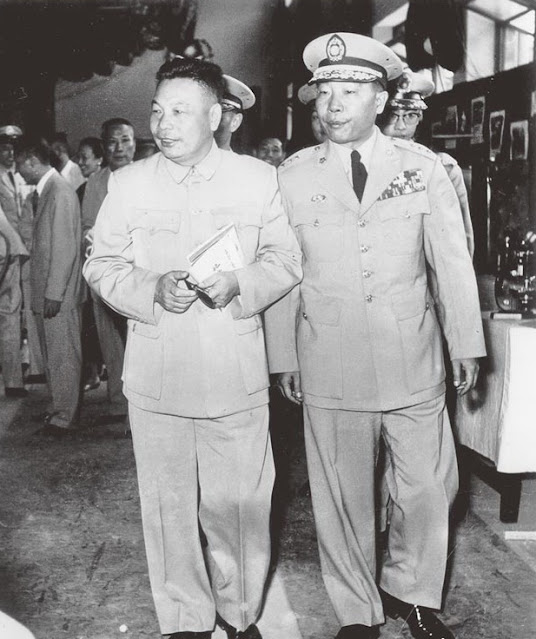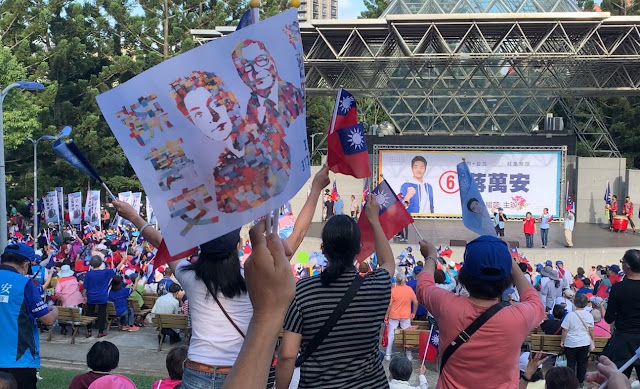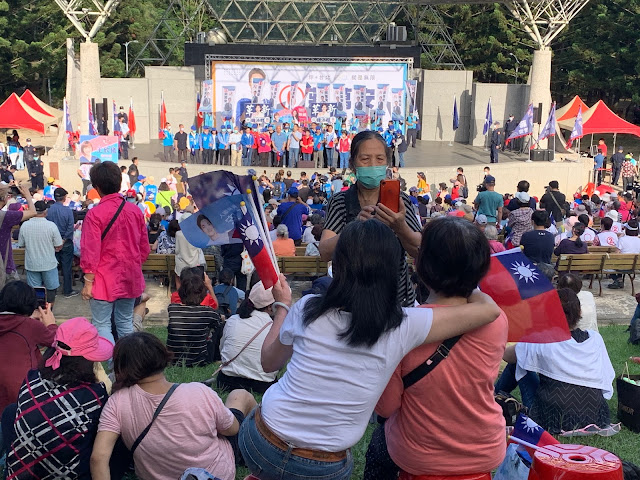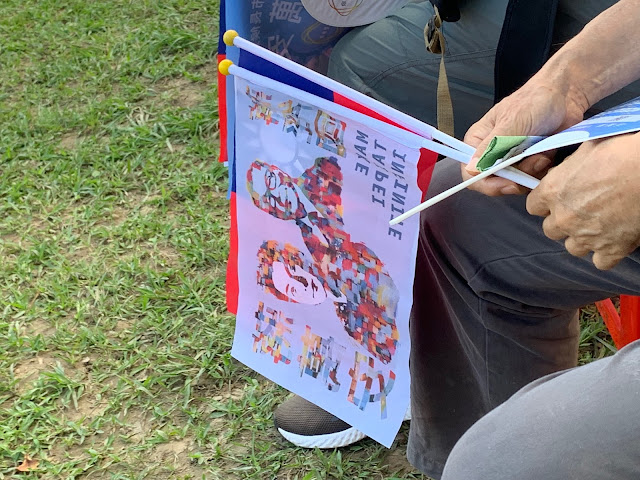
A long and unclear path
As the November elections neared, the social media posts piled up. Things like "Can't wait to vote for the first time in Taiwan!" and "Voting in my first Taiwanese election!"
A few years ago, I didn't know many dual citizens who were not born Taiwanese, and of them not a single one who could vote. As the shadows grew long on 2022, however, it became clear that something had shifted. Changes to the laws surrounding dual nationality enacted in 2017 were starting to bear some modest fruit: a small but significant minority of people I know were posting last month about how excited they were to vote in a Taiwanese election for the first time.
I was genuinely happy for them, in that friendly envious way that bears no ill will. To me, they represented small dots of light: these friends, for example, don't all come from the same background. Some work in business, some are academics, some in tech, and some do work for the government. Most have indeed acquired dual nationality, although one chose to renounce their original citizenship. Before 2017, there was essentially no path to dual nationality if one had no Taiwanese heritage. Post-naturalization, one could petition to regain their original citizenship, but not all countries grant it (the United States certainly doesn't). Or, finding Jesus and building a life as a missionary was always an option: perhaps as a nonagenarian the government might bestow the honor.
Now, anyone deemed a "foreign senior professional" -- a classification that differs from Gold Card-eligible "foreign special professionals" -- has a pathway to becoming Taiwanese. The eligibility requirements remain restrictive -- perhaps unfairly so -- but at least there is a path.
I thought, with the election well behind us, that it would be interesting to talk to some of these newest citizens about what it was like to acquire citizenship, what challenges they faced and how it felt to vote. Some agreed to have their real names published; others asked to remain anonymous.
Participating in Democracy
The first thing that jumped out from everyone I talked to was a passion for participating in the democratic process. Ben Homnick, formerly a vice president at a technology company in Taiwan, summarized it well: "I think it finally hit home," he said, "when I was walking back from the voting booth, and I realized that I finally have the ability to participate in the political process of the place that I’ve been calling home for more than ten years. Whether or not I agree with the outcome of the election, at least I have some measurable amount of responsibility for what those outcomes are."
Kerim Friedman, a professor at National Donghwa University, said he found personal meaning in voting for the first time. "For me, voting is kind of an important civic ritual," he said. "I’ve watched Taiwan, I came here for the first time in 1991 right after it had just democratized, so watching Taiwan’s transition to democracy has been a major part of my life intellectually and personally, having been here observing it."
"I was in tears," said Uma, who gave up her original nationality. (Uma is a pseudonym; she preferred to remain anonymous.) "I left [my native country] when I was a kid, I've never actually been back during elections." Uma's country of origin doesn't allow absentee voting. "I've always wanted to be part of the democratic process."
Jerome Keating, voting for his first time in Taiwan put it this way, "If you believe in democracy, and care for the place where you live, you want to be part of the process."
Some voting experiences were more neutral. Another friend, "Ted" (a pseudonym), works in the tech industry. He said he expected voting to "feel like a triumphant rite of passage." But when actually going through with it, he described the process as "largely confusing and empty. Despite spending many hours preparing, there was much that was novel. There were a lot of assumptions they didn't explain -- I didn't realize you couldn't take anything into the booth with you and I didn't realize the city council was FTPT [first past the post] with a multi-member district. The ballot doesn't list party affiliation...even though I prepared, I didn't know the numbers of my candidates, and was a bit lost without the parties [as there was no guide allowed in the voting booth]."
Uma agreed. Although she speaks Mandarin, she believes that "Taiwan needs to have more information for people who don’t speak Chinese. People didn’t know how many council people to vote for, and I wasn’t the only one. I asked how many people to vote for, and they said just one. And I was glad I asked that question."
Friedman described the process as "remarkably quick." He said, "You take all these papers and stamp them and put them in the boxes. I was surprised, I’ve voted in the states. It’s also often in schools in New York City, but I’ve always had to wait on line. There was no line at all, it was just in and out."
Friedman had no issue as a foreigner voting for the first time. "I twas all very cute and they stamped me, as I was at the counter and they were stamping me, the two women were speaking Chinese and I heard something about foreigners but they were all nice and polite and it was very quick."
Homnick and Uma also described the process as very fast. Uma added that with more and more foreigners gaining the right to vote, election workers didn't appear to be very surprised by her presence. There are guides -- Uma mentioned that there's a guide outside the booths that describes what is a valid or invalid vote, and the boxes where you place the various ballots are all color-coded, and there are people around to tell you what to do. Before the election, all eligible voters receive a newspaper-like bundle describing the candidates, with a picture, party affiliation and space for each to extol their platforms. The same paper is also displayed at the polling place.
However, that doesn't necessarily mean the process will be clear to dual nationals. "One Taiwanese guy tore his up, he was on the news. Two new immigrants form Hong Kong they brought theirs out. They were brought to the police station," Uma said.
Despite some of these issues, the overall feeling was jubilant. "In the US we’re so used to doing this. But inTaiwan [if you can't vote], you feel like you’re a passenger. You’re watching the election with your friends on election night, you’re kind of passive about it. Actually having some skin in the game, it feels different," Homnick observed.
"I was definitely elated to put my vote in," Keating added.
Becoming 'The Newest Taiwanese'
The actual process of getting Taiwanese citizenship and emotions around acquiring it seemed to influence how these new citizens felt about participating in the 2022 election.
Ted said he "didn't expect citizenship would change" how he felt or how his life worked. "I just wanted to belong. Boy, was I wrong. I feel like a totally different person. The US has fully become 'the old country'," he said.
One example is his attitude toward US policies. "I noticed that it made me way more ambivalent," he continued. "I wouldn't say my US politics have changed. I like Millenial socialism in theory, but find actual Millenial socialists a bit much. But it just takes up way less headspace than it used to."
For Ted, the most important change has been his ability to open businesses and protect his partner. "We are unable to marry as his home country doesn't recognize same-sex marriage, so instead of having a marriage, I have a business that sponsors his ARC."
Uma, who gave up her original nationality, said she felt like she was "betraying" her native land, and wished she'd perhaps waited longer to see if she qualified under the new regulations. "We did it because my daughter was graduating from school, and she was going to go to the Netherlands for college. She had a logical argument, she wanted to get Taiwanese nationality so she could travel around Europe freely, and didn’t want to go through the visa process," she said. (Uma's original nationality doesn't usually qualify for visas on arrival). "[My daughter] was under 20, and in Taiwan that’s considered not an adult, so one parent needed to do it with her. So I did it."
Homnick described the process as "bittersweet", pointing out that it feels like only a small step in the right direction.
"In some ways it’s the culmination of 13 years in Taiwan and calling this country my own," he observed. "On the other hand, it’s often a publicity stunt. There's always a press release, and they make the giant ID card. It's like, 'hey look how international we are', without always being super international. And I think it’s great personally, obviously there are benefits to having an ID. But does it really serve the purpose of paving the way for more acceptance of dual citizenship? I think it probably does — any sort of cracks in the long-time policies of excluding most immigrants from citizenship are probably a good thing, even if it’s just getting visibility to starting a conversation."
Ted did not experience the publicity 'circus', however. There was no press release and after some thought, he declined to be interviewed by the media.
Friedman also pointed out the narrowness of the path to dual nationality, but added that there is a logical explanation for it.
"I’d like to see Taiwan become more multicultural," he said. "The vast majority of foreigners in Taiwan are Southeast Asian workers. So if Taiwan did open [dual nationality to more people], they would be the main beneficiaries. If Taiwan were to shift to becoming more of a Southeast Asian country, and more of an immigrant country the way the US and Europe are more immigrant countries....wherever that’s happened, it’s sparked anti-immigrant backlash mostly sparked by false information and false ideas about who immigrants are and their impact on the economy. Most studies show that immigrants are actually good for the economy and don’t cause rises in crime. But you know Taiwan’s media landscape...and you can imagine how that’s going to be spun by the media."
He went on to emphasize that much of this backlash is sparked by political and media disinformation. "Fearmongering from some politicians and the media are going to be a challenge. So I don’t blame the government for being a little cautious."
In terms of the difficulty of actually acquiring dual nationality, experiences varied quite a bit. All encountered challenges, though some, such as Friedman, found the process smoother than others. Some found the challenges, including significant ones, to be less than expected. Others encountered more difficulties than they'd anticipated. The only universal was that no one's journey was entirely without obstacles.
For Homnick, the whole process took about a year and included an initial rejection. "I applied thinking that I had been a vice president with a tech company for awhile, I’d done some open source projects that had to do with TW as well. I figure that would be enough...the first time I actually got rejected. They were pretty good about giving feedback, they said, 'we felt you didn’t have enough contributions to Taiwan.' It was good of the committee to give me the feedback, even though I think the standards are ridiculous. So I went back, got a bunch more recommendation letters, and really focused my application on contributions to Taiwan."
He added that some fields seem to provide easier paths to dual nationality than others. Academia in particular, he said, "seems to be one of the reliable ways to get through the committee. You have to be an associate professor, and if you have that you are pretty much greenlit."
Ted had a more difficult time of it than either Homnick or Friedman, calling the process an "unparalleled chore." He applied through the Ministry of Science and Technology, and submitted his tech portfolio as proof of contributions to Taiwan. He also noted that one has to have Mandarin language proficiency.
"[For] the second phase review, my local HRO (Household Registration Office) demanded 39 separate documents, including an FBI background check translated into Chinese, verified by TECRO, and then again by the Ministry of Foreign Affairs, then notarized, then translated, then notarized again," Ted recounted. The local office rejected the translation twice...after giving them all that, they said that I wasn't qualified. It took the intervention of my new employer, lawyers, the Ministry of Science and Technology and the National Development Council to convince the HRO to forward the application."
However, he states that he's not resentful about the process. "I actually thought it would be worse," he quipped.
Uma also faced challenges as a new citizen. Receiving citizenship doesn't necessarily grant all the rights of citizenship immediately, as she found out to her detriment.
She said, "There’s a lot of paperwork you need to give up your own nationality. After that, it’s better if you don’t travel for a period, maybe a year. You just have a passport but it does not show your ID card [because] you don’t have a household registration. So you don’t have the visa-free entry to anywhere in that year. If you have to travel, you have to wait two years to get your household registration. So we didn’t travel for that year, and I lost a lot of job opportunities by staying. After one year we got the national ID the household registration and everything, the works. [Since then] it's just been like a Taiwanese citizen [for me]."
While Homnick noted that gathering paperwork was the most time-consuming part of the process, Friedman emphasized that it comes in two steps, and one is smoother than the other.
"The first step is to get approved as a special foreign professional," he said. "Once that comes through you are allowed to apply for citizenship without having to give up your passport. That’s fairly simple and straightforward. The first part is occupation specific, and each occupation has their own procedures.
As a professor, I go through the Ministry of Education....The fact that you’ve already been given tenure is proof that you’re a special foreign professional. For a filmmaker, unless you’ve won an Academy Award or something. Some of these professions are made for it, like basketball players, or if you have a Plum Blossom APRC [which] is already proof that you are a special foreign professional. There are certain disciplines where it’s much easier to do it than others."
"It’s a little arbitrary," he continued. "But if you happen to be lucky enough to fit into one of these slots — priest, basketball player…then it’s not that hard. Usually if people have problems, it’s because their institutions weren’t supportive of them. I think as time goes on, more and more institutions [will be] willing to do the process."
Uma agreed, saying that "I used to think you have to be 90 years old and build 90 churches to get citizenship, and that’s too hard. Even now they’re not very realistic. Even now, people who’ve really contributed and who really deserve it are falling through the cracks. It’s getting better, Taiwan is like that."
Homnick added that it seemed as though someone who didn't have specific institutional backing would need to "win a Nobel Prize" to qualify.
Who's a Foreigner? Who Isn't?
Everyone had something to say about how Taiwan regarded them in the context of being newly, officially local, both in general and in the context of last month's election. Most didn't cite ongoing discrimination, however, it bears mentioning that of the people I interviewed, only one was a person of color.
Friedman said that when he went to vote, "the two women were speaking Chinese and I heard something about foreigners but they were all nice and polite," and that more than voting itself, talking to others about becoming a citizen might have some kind of impact. "But it's hard to know," he admitted. He also noted that he talks about how perceptions of him as an "American Taiwanese" are likely to be quite different than Taiwanese who gain US citizenship and become "Taiwanese Americans".
In line with Friedman's earlier point that it would benefit Taiwan to be more multicultural, Homnick noted that while he does have neighbors who will sometimes complain or assume the "foreigner" is at fault, the doormen of this building will stand up for him, especially now that he is a citizen. "They'll stand up when people say 'waiguoren'," he said, "they'll say 'he's not a foreigner!'"
"It's going to take awhile to get over that stuff. Having people who break conceptions of what a Taiwanese person looks like are probably good in the long run. And I think that’s really in the benefit of Taiwan in the long run as well. You look at China which has tried so hard to become this ethnonationalist state, anything Taiwan can do to set themselves apart from that is a good thing."
Uma described her experience when voting: "I think there are more and more foreign faces with ID cards now, so they’re not that surprised. First they said, 'do you have an ID?' I said yes. I had my ID in hand so they understood I was a citizen."
"I no longer care if people mislabel me as a foreigner, or try to speak English when Chinese would be easier...I have nothing more to prove, but seeing my partner face so much discrimination is heartbreaking. As a foreigner, I always felt like citizens had so much untapped power, but now as a citizen I feel this kind of surreal helplessness. I'm safe, but I cannot extend that safety to others," Ted added.
Homnick also noted discrimination against Southeast Asian immigrants in Taiwan, citing a bulletin in his building requiring families to sequester any domestic workers in their apartments during the pandemic, and not let them leave. "That's definitely illegal," he clarified. "I said, 'if you don't take this down I'm calling the police." (The notice was taken down.)
While voting and being part of the political process is the most meaningful benefit Homnick says he's derived, the one he feels on a daily basis is having a regular Taiwan identity card. "The biggest quality of life improvement is having the number that works on websites, he said. "Which is funny because they said they were going to solve this issue by standardizing the ID numbers, but their solution didn't fix anything!"
Homnick also noted that access to government subsidies and other services is a major benefit, but that he's never tried to get something like a mortgage. "Some things haven’t changed," he added. "I still get called laowai, waiguoren, people still ask for an ARC. I went to Chunghwa Telecom to renew a contract and they still wanted to see an ARC, and I needed to explain that I don’t have [one]. There’s still some discrimination by banks. It’s more about being born outside of Taiwan."
The November Election
One thing struck me as I talked to this group of new Taiwanese with many divergent experiences: the extent to which they agreed on the November election.
"Politically, I have way less patience for the KMT than I used to. I was never a tankie, but I was educated by them and felt they had good points on some issues [such as nuclear power]. But I'm not willing to entertain them because I don't trust them to handle China, and if they don't get that through their heads, the party and country will suffer. The Communists might not allow me to leave the way a foreigner could," Ted observed.
Homnick is similarly worried. "I am a lot more wary of China," he said. "I don’t think I’ll ever go back to China. I think the national security law probably applies to me now. Even if it doesn’t, it’s not worth taking the risk. What if they start arbitrarily detaining Taiwan citizens? What happens to citizens if there is some kind of conflict?"
"I didn't have a lot invested in who was elected to the city council," Friedman said. "but I really cared a lot about the referendum [to lower the voting age to 18], and I’m very upset about that. I didn’t expect it to win. I was for it [but] I was shocked by now disinterested and now unmotivated people were to make sure that it passed...for me, it seemed an important measure in terms of Taiwanese democracy. And it’s again something I’ve talked about with my students. I have had students who said they thought they weren’t mature enough to vote. I showed them a map of how in other countries, 16 or 17 year olds might [have voting rights]. 'Do you really think you’re less mature?'"
He continued, "Then they started thinking, maybe you have a point. Even young people seem to buy into [the attitude that they shouldn't be voting.] I found that very depressing, I think it’s important for young people to become civically engaged and start participating in the process. Politics shouldn’t be left to just old people either."
Homnick agreed, saying he was "disappointed but not surprised" regarding the election results. "I feel like I don’t have a good understanding of why people vote the way they do. I’m not sure I have a good understanding in the US either. I don’t see why anyone with Chiang in their name is still relevant these days. [My girlfriend said] her friends said they voted for him because he's handsome, or their parents told them to. [But] if you want to pick the most handsome candidate, you have the right to. No matter how I feel about it, it’s your choice. I was disappointed about the referendum on voting age. A lot of the justifications for people voting against that: '18 year olds are not mature enough to make decisions like that.' Well they’re not going to be if you treat them like children!"
Friedman tended to agree regarding the election of Chiang Wan-an as Taipei mayor. "It's hard for me to know how much of a factor it played, it's obvious that Wan-an is cashing in on the Chiang name, which is weird that that would have resonance for people. One argument is 'well, they didn't really vote for him for that reason', [but] the fact that he chose that name didn't hurt him either. It's like in the Philippines with the Marcos family getting re-elected. The parallels are interesting."
"I’m really sad the referendum thing didn’t go through," Uma concurred. "The voting age should be 18. They’re saying there wasn’t proper education about it. There might have been some misinformation as well. People were saying that older people thought that people aged 18-20 could also run for elections as a candidate, and older people didn’t like that, so they voted against it."
Not everyone expressed a specific opinion on candidates, but Uma offered one perspective: "Chen had a town hall for foreigners, when he started [campaigning], when he first announced, and I got to go. And I interacted with him and…I watched him for 900 days. I was very excited to have the possibility of being mayor. So that was quite sad."
In the end, Friedman and Uma offered up perspectives that perhaps summarized the feeling of participating in a democratic process as citizens rather than foreign residents.
Although Friedman described voting as "a little anticlimactic", he didn't mean it in a negative way. "For democracy to be kind of boring is a good thing," he said.
In fact, Friedman pointed to social movements as another vital part of civic engagement and the democratic process. "When the Sunflower movement happened, the students we had comment to university were very politicized. Since [then], that faded into the background, young people seemed less politically involved. It’s interesting, because my general feeling is that the quality of education is improving in Taiwan, and the quality of college students is improving, [but they seem] less politicized...Wage justice, environmental justice -- there are some, but broadly speaking people tend to be more focused on their personal career. Social movements invigorate people and get people involved in politics."
"Because when we say Taiwan is a beacon for democracy in Asia, it’s like the front line against an autocratic country," Uma concluded. "I feel like I’m part of it. And I’m not sure whether it excites me or scares me. Family back home, [ask] 'aren’t you scared of living in Taiwan?" Because the media really hypes up the whole China thing, [such as] when Pelosi came and [China's military drills]. I said no...it’s just like part of our daily lives. It’s something we’re used to...Taiwan is upholding this light of democracy, and Taiwan is dealing with that on a daily basis. Being part of the voting processes [and] making sure they don’t sell Taiwan out to China is an important part of that."



















